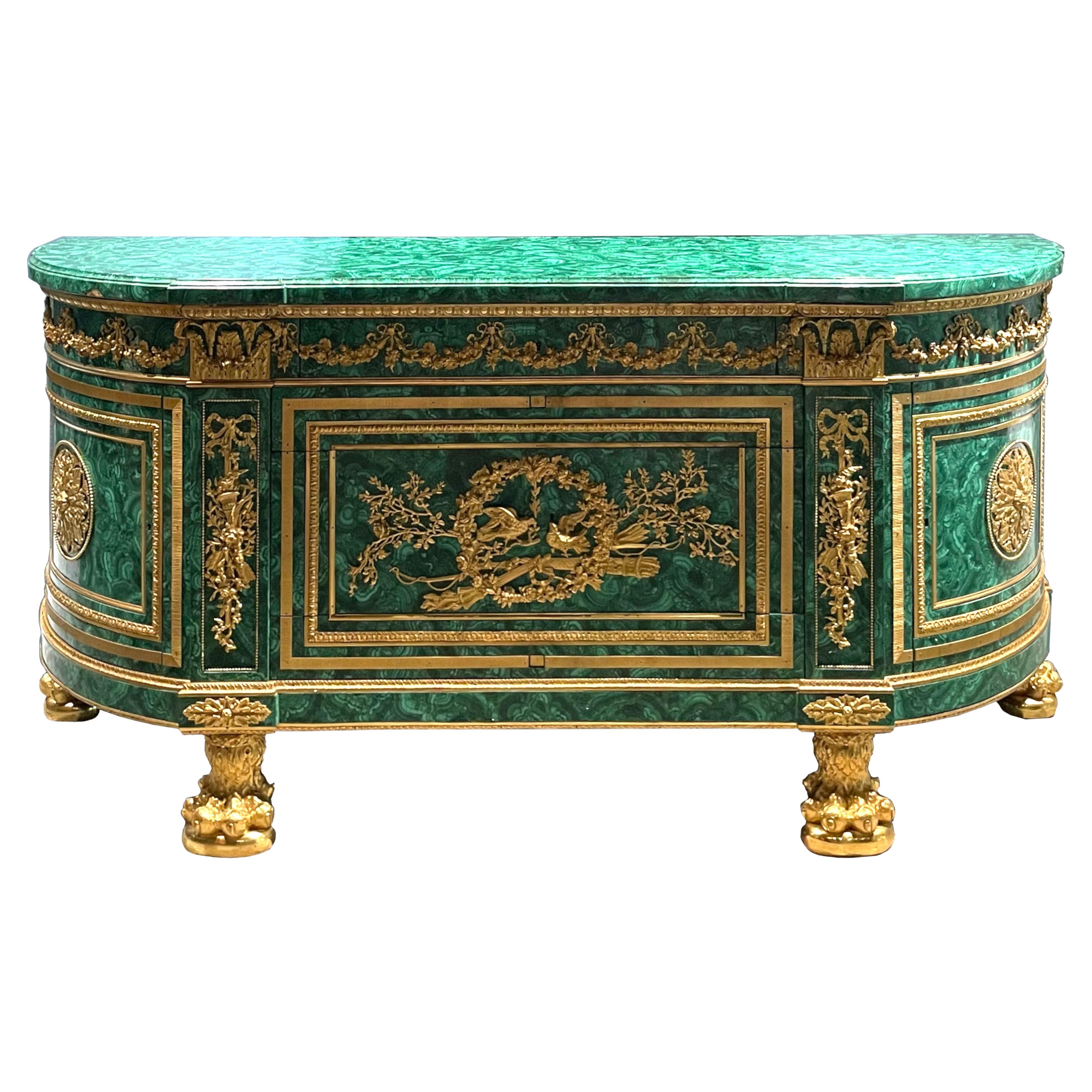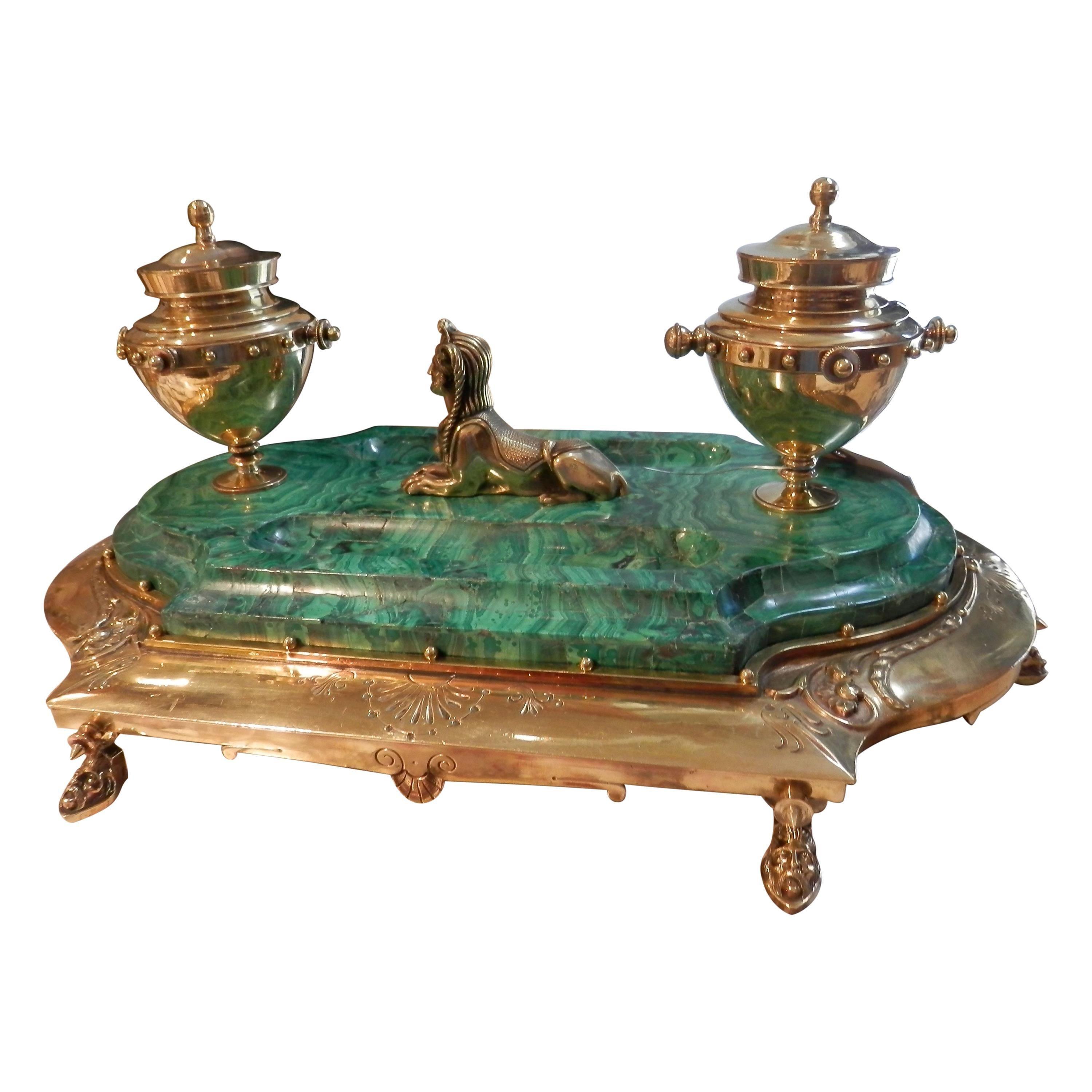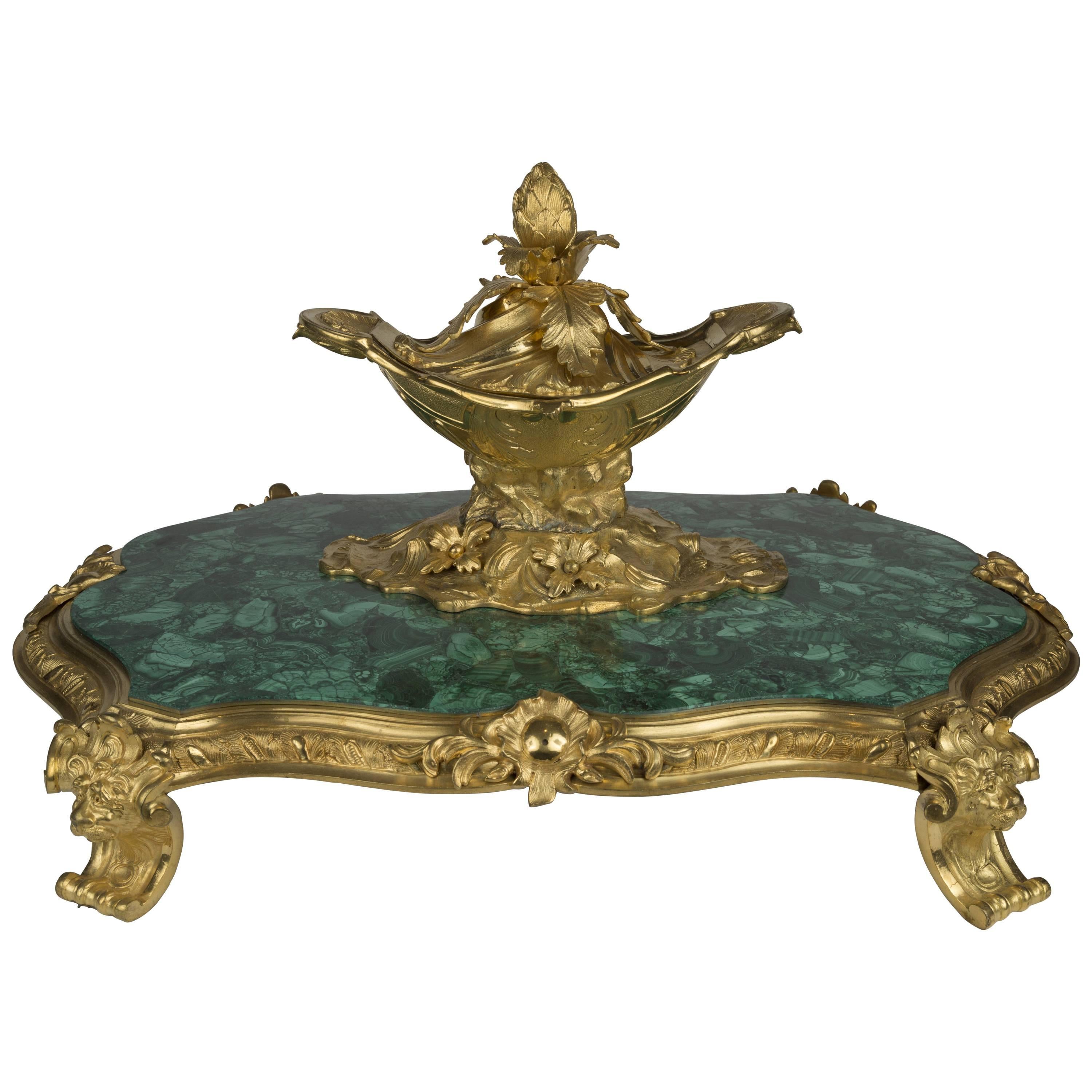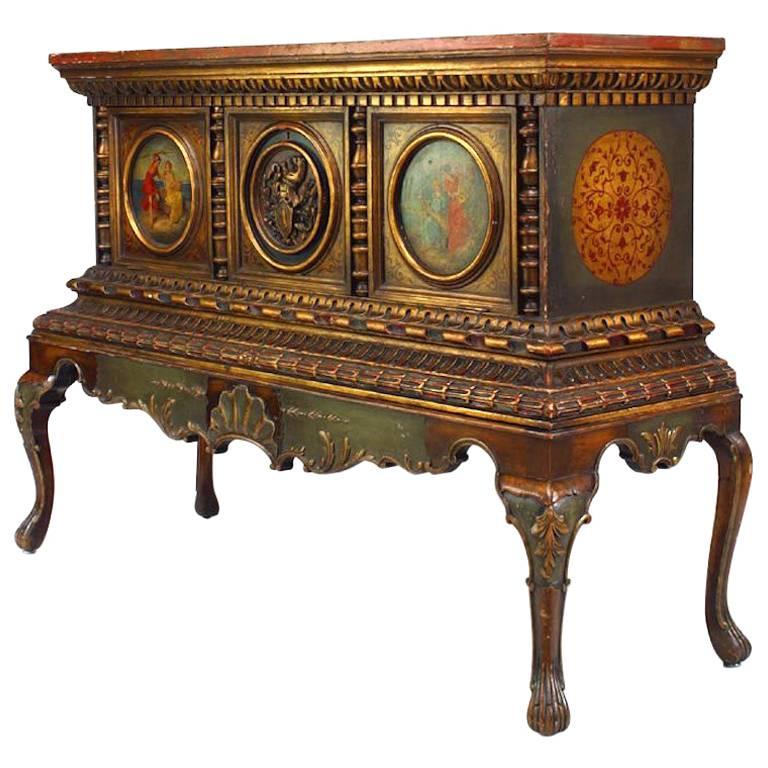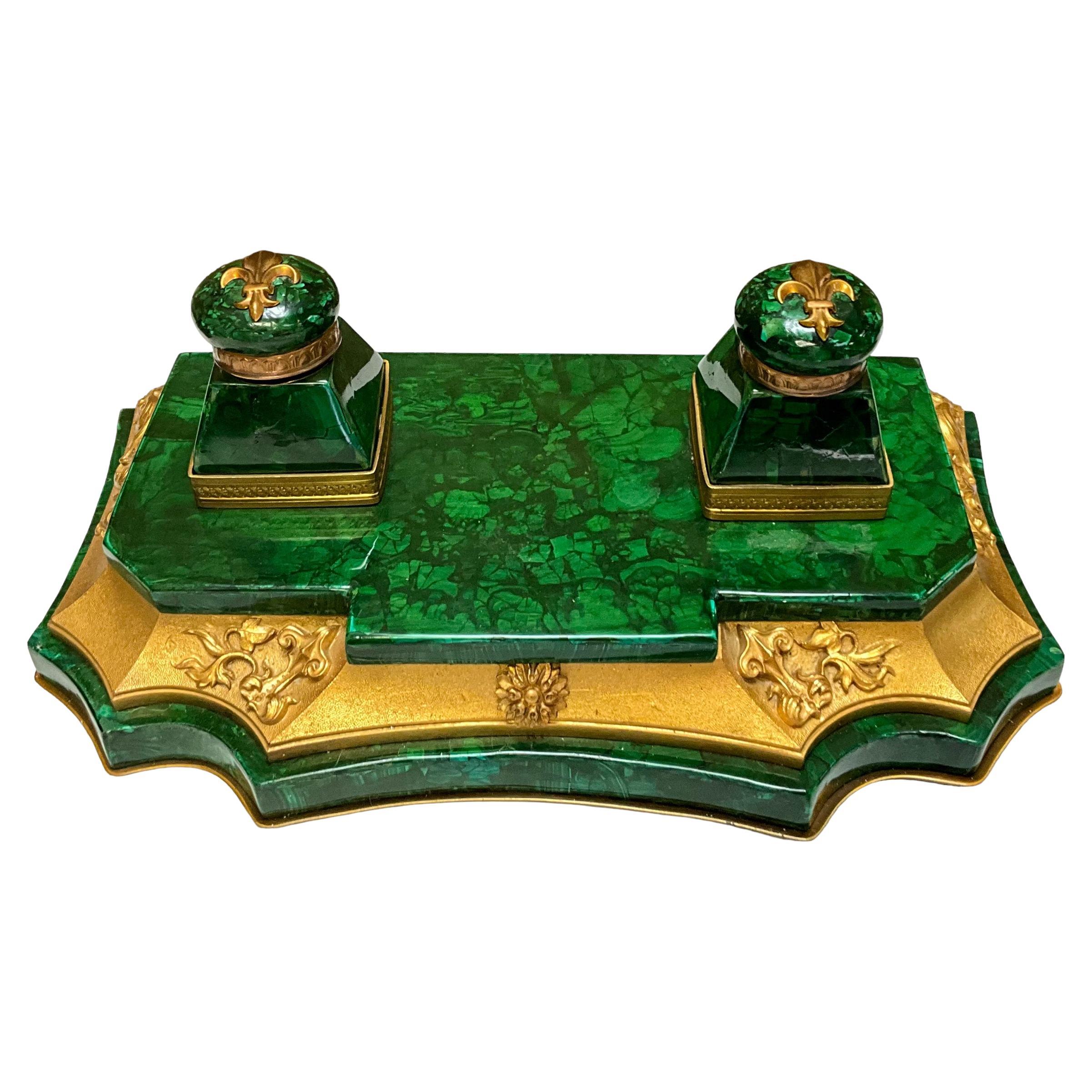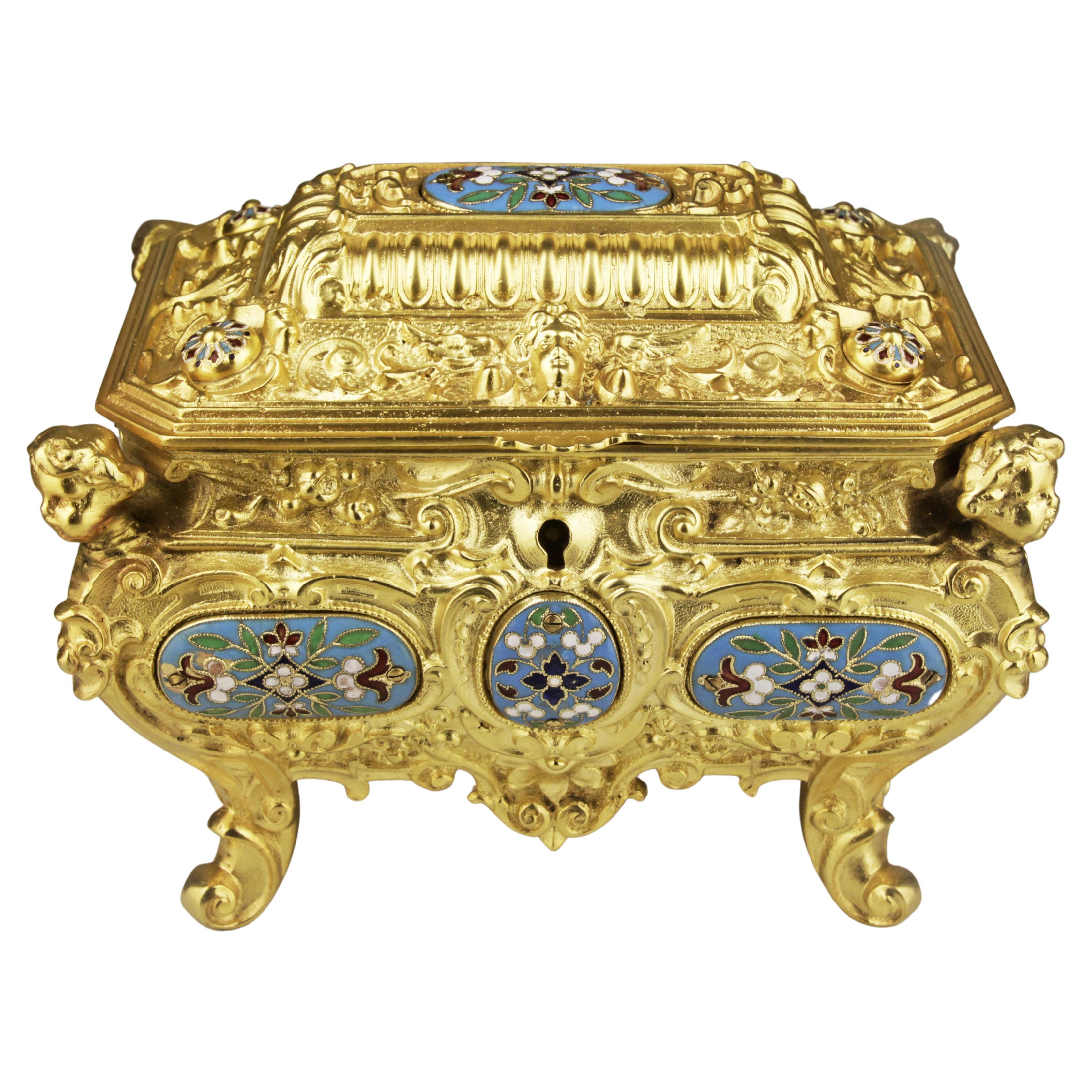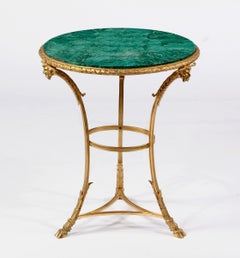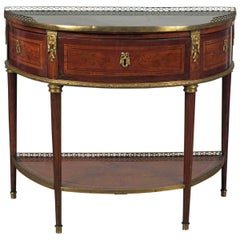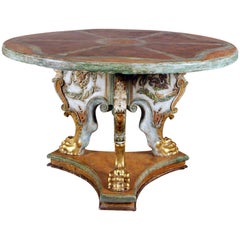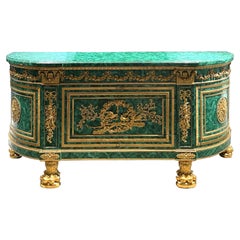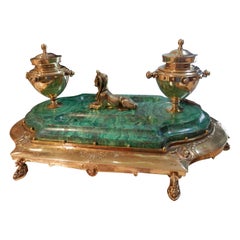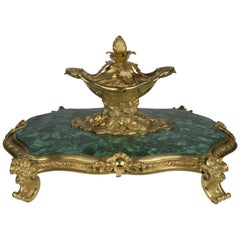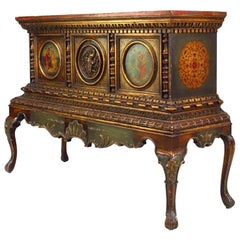Items Similar to A Renaissance Revival , Copper & Brass Mounted with Malachite Top, Jewelry Box
Want more images or videos?
Request additional images or videos from the seller
1 of 8
A Renaissance Revival , Copper & Brass Mounted with Malachite Top, Jewelry Box
$28,000
£21,268.29
€24,508.28
CA$39,430.94
A$43,715.02
CHF 22,973.95
MX$535,000.17
NOK 286,921.27
SEK 269,304.32
DKK 182,939.08
About the Item
A Rare & Important Renaissance Revival
Copper & Brass Mounted with Malachite Top
Jewelry Box on Stand
Elkington & Co., England
Dated 1856
Elkington & Co; Birmingham, England; 1854 - 1883
With a rectangular top and velvet-lined interior, the sides mounted with plaques depicting a court scene and armorial plaques to each side, the stand with circular turned rods and stretchers
Height 39 in. Width 24 ½ in. Depth 17 1/2 in.
Museums:
Power House Museum, England
South Kensington Museum
Victoria & Albert Museum, England
National Maritime museum
Los Angeles County Museum of Art
Museum of Fine Arts, Boston
Glasgow Museum
Elkington and Co.
The electroplating firm of Elkington and Co is of interest to these pages for its sculptural work, on the small scale, and more importantly, for full-sized bronze statues. The company was set up by two cousins, George Richards Elkington (1801-1865) and Henry Elkington (1810-1852), who along with others, were experimenting with electroplating base metals during the 1830s. By 1840 they had patented their method in Britain and France, and bought out competing patent-holders, though they later licensed the process to various firms in England and abroad. The Elkington factory was in Newhall Street, Birmingham, and they also opened premises in London. In 1842 they took on a third partner, called Josiah Mason, and the firm became Messrs Elkington, Mason and Co.
Messrs Elkington have now in constant operation a stupendous machine constructed for the application of Magneto-Electric power, .. The armature of the machine, set in motion by a small steam-engine, revolves at 500 times in a minute, at a short distance from the poles of a series of 64 permanent magnets, arranged in a circle… sufficient to deposit 50 ounces of silver per hour. This machine has been in operation almost continually day and night for six months, with scarcely any perceptible variation in its energy.
By the time of the Great Exhibition they were the leading producer of plated wares,
'...celebrated electro-plate manufactures, a branch of industrial art which has made immense strides since the patent for the various processes of gilding and plating metals by the agency of electricity was granted to this firm in 1840. Messrs Elkington alone employ about 500 work-people in their establishment, and about 30 other British manufacturers have licences to use this process, which is also extensively adopted in foreign countries...'
The process for electrotyping (duplicating) to make statues was described thus:
'...to such perfection has the process been brought that not only are silver waistcoat-buttons and exquisite pieces of bijouterie produced, but a statue of bronze, as large as that of the Duke of Wellington at Hyde Park Corner, could be made of any thickness merely by electrical deposits... in fact the figures are hollow, and the entire substance employed is unalloyed bronze. To produce an electro-deposited figure, the model of it is formed, and from this a mould of fine clay or plaster is taken, the interior of the mould being thus an exact counterpart of the exterior of the model. On this being placed in a trough containing a solution of copper, the mould is rendered conducting, and the metal, gradually deposited inside the mould, becomes, in its turn, an exact counterpart of the original model. It will be understood from this brief description, that from the metal not shrinking in cooling, as in ordinary instances of casting, beauties and faults must alike be copied. The product in bronze is, in fact, an exact reproduction of the artist's conception, unalloyed by any mechanical imperfection almost necessarily attendant on the old process.'
Commenting on the success of the firm, writing shortly after the Exhibition, an art magazine wrote that
The show-rooms, which, astounding as it may seem, are longer than the body of the far-famed Birmingham Town-hall, though, of course, they are not to be compared in height with that splendid pile. … One division of these rooms is appropriated to bronzes: the Theseus reduced from the work of Phidias, among the Elgin Marbles, the Venus di Medici, Eve’s Hesitation by John Bell, with other works of modern art, a colossal head of Ocean from the Antique, with his sea-weed beard, and other marine appurtenances of the watery god...
Prominent is a bronze group, showing Tewdric the Great, King of Gwent and Glamorgan, who is shown wounded, yet urging on the pursuit of the flying Saxons, attended by his daughter, and an aged bard in the act of proclaiming the victory...' [I believe this work, on the left in the engraving above, is the one now in the National Museum of Wales, Cardiff.
Box INV. 20
- Dimensions:Height: 39 in (99.06 cm)Width: 24.5 in (62.23 cm)Depth: 17.5 in (44.45 cm)
- Style:Renaissance Revival (Of the Period)
- Place of Origin:
- Period:
- Date of Manufacture:Circa 1856
- Condition:Wear consistent with age and use.
- Seller Location:Sheffield, MA
- Reference Number:Seller: Box201stDibs: LU8339768527
About the Seller
4.8
Vetted Professional Seller
Every seller passes strict standards for authenticity and reliability
Established in 1980
1stDibs seller since 2017
50 sales on 1stDibs
Typical response time: 4 hours
- ShippingRetrieving quote...Shipping from: Sheffield, MA
- Return Policy
Authenticity Guarantee
In the unlikely event there’s an issue with an item’s authenticity, contact us within 1 year for a full refund. DetailsMoney-Back Guarantee
If your item is not as described, is damaged in transit, or does not arrive, contact us within 7 days for a full refund. Details24-Hour Cancellation
You have a 24-hour grace period in which to reconsider your purchase, with no questions asked.Vetted Professional Sellers
Our world-class sellers must adhere to strict standards for service and quality, maintaining the integrity of our listings.Price-Match Guarantee
If you find that a seller listed the same item for a lower price elsewhere, we’ll match it.Trusted Global Delivery
Our best-in-class carrier network provides specialized shipping options worldwide, including custom delivery.More From This Seller
View AllA Fine French Gilt Bronze & Malachite-Top Gueridon by Henry Dasson
By Henry Dasson
Located in Sheffield, MA
A Fine French Gilt Bronze Gueridon with Malachite-Top
By Henry Dasson , 1825-1896
Circa 1870’s
The circular Malachite top on incurved supports terminating
in rams’ heads and join...
Category
Antique 19th Century French Gueridon
Materials
Bronze
Louis XVI Gilt Bronze Mounted Tulipwood Marquetry Console Desserte
Located in Sheffield, MA
A Louis XVI gilt bronze mounted
tulipwood marquetry console desserte,
last quarter of the 18th century.
The D-shaped gray marble top with three-quarter pierced gallery, above a frie...
Category
Antique Late 18th Century French Louis XVI Console Tables
Materials
Kingwood
A Louis XV Ormolu mounted Tulipwood, Kingwood & Parquetry Collectors Cabinet
By Jean-François Oeben
Located in Sheffield, MA
A Fine Louis XV Ormolu mounted Tulipwood, Kingwood & Parquetry Collectors Cabinet
Mid 18th Century
Attributed to Jean-François Oeben
The shaped marble top over a shaped cabinet with tulipwood, kingwood & parquetry throughout, with tambour shutters revealing a re-fitted interior with 6 graduating drawers, all over four cariole legs ending in gilt bronze sabots.
Height 41 in. Width 38 in. Depth 20 in.
Jean-François Oeben, ébéniste du roi in 1754 and maître in circa 1761.
Jean-François Oeben was a sub-tenant of charles-joseph boulle (1688–1751) in the galleries of the louvre from 1751, and in 1754 was granted lodgings at the gobelins and then at the arsenal in 1756. he was appointed ebéniste du roi in 1754 and was therefore able to work outside guild restrictions. he was a protégé of the marquise de pompadour, the marquis de marigny and the duc de choiseul. his identifiable works span less than ten years. his earliest pieces are in the louis xv style (e.g. small table, 1756–8; munich, residenzmus.), and he seems even to have completed some pieces started by jean-pierre latz (e.g. pair of corner cupboards...
Category
Antique 18th Century and Earlier French Louis XV Cabinets
A Polychrome and Parcel Gilt Baroque Center Table
Located in Sheffield, MA
With a later round decorated top over three carved figures each with a symbol on each side, ending with paw feet on a later triangular plinth,
decoration refraiched,
The six symbols...
Category
Antique 17th Century Italian Baroque Center Tables
Materials
Wood
Fine Empire Style Gilt Bronze Mahogany Center Table inthe Manner of Jacob-Desmal
By Jacob-Desmalter
Located in Sheffield, MA
A fine Empire style gilt bronze mahogany gueridon or centre table
With a verde antico marble top.
In the manner of Jacob-Desmalter,
circa 1880
Height 31 1/4 Diameter 35 in.
A very fine Empire style gilt bronze-mounted mahogany guéridon after a model by Jacob-Desmalter, the circular verde antico marble top above a mahogany frieze mounted with laurel leaf banding in between rosettes and anthemions, supported of the heads of three finely cast gilt bronze female caryatids, each facing outward with hair in plaits, bare feet and arms crossed, wearing arm bands and a low cut diaphanous dress gathered up toward her breast, the stretcher centred by a chased covered urn flanked by three elegant crouching winged sphinxes wearing Nemes headdresses and plaits tied at the front.
The design for this superb guéridon is based on a famous table-console or ‘console double face’ by the celebrated firm of Paris ébénistes Jacob-Desmalter which was itself based on designs by Napoleon’s chief architects and ornamentalistes Charles Percier (1764-1838) and Pierre François Léonard Fontaine...
Category
Antique 1880s French Empire Gueridon
Materials
Bronze
Italian Venetian Louis XV Painted Stand
Located in Sheffield, MA
An Italian Venetian Louis XV painted stand
18th century
Decorated throughout with a single drawer over two cupboard doors all on cabriole legs.
M...
Category
Antique 18th Century Italian Louis XV End Tables
You May Also Like
Empire Style Gilt Bronze Mounted Malachite Commode
Located in West Palm Beach, FL
Empire Style Gilt Bronze Mounted Malachite Commode
Late 19th Century.The shaped malachite veneered top above a conforming case, fitted with two drawers flanked by cabinet doors, on ...
Category
20th Century Center Tables
Materials
Malachite
19th Century Russian Malachite and Gilt Bronze Large Inkwell
Located in Dallas, TX
Rare and exceptional 19th century Russian gilt bronze and malachite inkwell. Gilt Sphinx with two ink deposits and double sided pen holders.
Category
Antique Late 19th Century Baltic Baltic Inkwells
Materials
Malachite
19th Century Large Malachite and Ormolu-Mounted Centerpiece
Located in New York, NY
Very large Louis XVI malachite and ormolu-mounted centerpiece
ornate gilt bronze lidded dish with floral leaf motif
accentuated and raised with figural lion mounts
France, 19th centu...
Category
Antique 19th Century French Louis XVI Centerpieces
Materials
Malachite, Bronze, Ormolu
Italian Renaissance Style Polychromed Gilt Chest
Located in Queens, NY
Italian Renaissance style (late 19th Century) polychromed and parcel gilt chest on a stand with round painted panels and faux marble top.
Category
Antique Late 19th Century Italian Renaissance Revival Cabinets
Materials
Plywood
Early 20th-C. French Gilt Bronze And Malachite Desk Pen Inkwell / Inkstand
Located in Kennesaw, GA
This is an early 20th century highly decorative French gilt bronze, malachite and faux malachite inkstand with dual inkwells. The base is a mix of faux malachite and malachite veneer...
Category
Early 20th Century French Louis XVI Inkwells
Materials
Malachite, Bronze
$1,346 Sale Price
25% Off
19th Century French Empire Cloisonné Bronze Jewelry Casket with Velvet Interior
Located in North Miami, FL
19th century French Empire cloisonne bronze jewelry casket with blue velvet interior
By: unknown
Material: bronze, velvet, enamel, metal, copper
Technique: gilt, cloisonné, champlevé, cast, molded, metalwork
Dimensions: 5 in x 7 in x 6 in
Date: late 19th century, circa 1890
Style: Napoleon III, Rococo Revival, Neoclassicism
Place of origin: France
This richly gilded jewelry...
Category
Antique Late 19th Century Rococo Revival Jewelry Boxes
Materials
Bronze, Enamel, Metal, Copper
More Ways To Browse
Call Box
Antique Silver Jewellery Box
Antique Box Stand
Old Antique Jewelry Boxes
Box On Stand
Antique Bar Box
Antique Game Box
Antique Metal Jewelry Box
Antique Artist Box
Brass And Silver Box
Antique Decorative Brass Plates
Antique Jewellery Boxes London
Small Antique Silver Boxes
Bronze Box Large
Antique Copper Box
Brass And Copper Box
Deposit Box
Renaissance Copper
